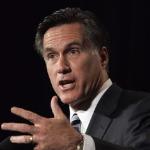Romney's Anti-Populist Economics
 When No Apology, turns to economic policy -- for the first time in the book -- the reader can hear Mitt Romney's voice as he speaks out in favor of TARP and for government investment in basic research.
When No Apology, turns to economic policy -- for the first time in the book -- the reader can hear Mitt Romney's voice as he speaks out in favor of TARP and for government investment in basic research.
Click here for all of David Frum’s blogposts on Mitt Romney’s “No Apology”.
Two-fifths of the way through No Apology, the book turns to economic policy, and ... wait a minute ... look who just arrived ... it's Mitt Romney! Chapter 5 deals with productivity, trade, and labor standards. For the first time in the book, I can hear Mitt Romney's voice as the pages turn.
And they are good pages, too, smart and well-informed. I didn't know this, for example:
[R]isk capital tends to be invested quite locally. California's venture capital firms invest almost 60 percent of their funds in California businesses ... Firms in Massachusetts, the number-two venture state after California, invest nearly 40 percent of their capital in Massachusetts; they spend more than six times as much at home as in New York, a nearby state with a much larger economy. (135)
In Chapter 5, Romney speaks out forcefully for free trade, skills-based immigration, pro-growth tax policies, and light regulation. Again and again, Romney brushes aside populist economics of left and right. He speaks out in favor of TARP, for government investment in basic research, and against those who'd penalize corporations that "send jobs overseas."
Sales made by subsidiaries of U.S. corporations are often supported by high-paying jobs in finance, accounting, research and management here at home. And if a company's tax burden under such [anti-offshoring] legislation grew too high, it could simply move overseas to avoid it - resulting in a net loss of tax revenue for the United States, not a net gain. (134)
Romney takes time to dismiss the "fair tax" advocated by Mike Huckabee as regressive and illiterate. He scoffs at claims that the fair tax would eliminate the IRS. "[A] government agency of some kind woud have to ensure that people weren't bartering or finding other means to avoid paying such a substantial tax on the goods and services they purchased." (130) He does admire the economic efficiency of the VAT, but prefers to get to a consumption tax by eliminating taxes on savings for middle-income families.
Romney disdains the rhetorical libertarianism that has overtaken the GOP since 2008. "I believe some people in my party are overly fond of bashing regulation .... [R]egulations that are clear, fair, and relevant to contemporary circumstances provide that predicatibility and stability that is [sic] needed for investment and risk-taking." (136)
He backs this generalization with a story.
Back when I was at Bain Capital, one of our first venture capital investments was in a technology that allowed machining companies to reuse their cutting oil - the cooling lubricants that are used in drilling, routing, and cutting metals. New government regulations had just been established to prevent companies from simply throwing used oils down the drain. The regulations ultimately led to better machining industry practices, but because they weren't enforced for almost a decade, we lost our investment. Michael Porter is convinced that, far from being a drag on the economy, 'National advantage is enhanced by stringent standards that are rapidly, efficiently, and consistently applied.' I wish more Republicans and Democrats alike understood that important truth." (136)
NB Citations of Harvard management guru Michael Porter in No Apology: 4. Citations of Bible: 1.
Also NB: Shout outs to CEOs in Chapter 5: 3, including one to the CEO of Novartis.
Final NB Correction for paperback edition, p. 108. Hero, the inventor of the ancient steam engine, lived in Alexandria, not Rome.